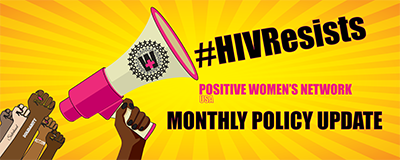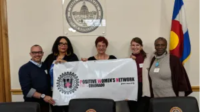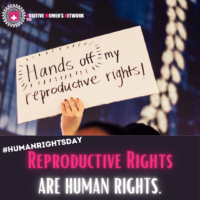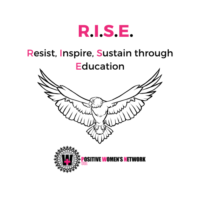
Health Care Access
The federal government approves Georgia’s plan to leave Healthcare.gov
 You may remember that back in September, PWN sent out an action alert asking you to submit comments to stop the federal government from approving Georgia’s plan to leave HealthCare.gov, the federal marketplace that 500,000 Georgians use every year to enroll in private health plans and Medicaid. PWN submitted a comment as well asking that the U.S. Department of Health and Human Services (HHS) not approve the plan, which could lead tens of thousands of Georgians to lose their health insurance and to pay higher premiums.
You may remember that back in September, PWN sent out an action alert asking you to submit comments to stop the federal government from approving Georgia’s plan to leave HealthCare.gov, the federal marketplace that 500,000 Georgians use every year to enroll in private health plans and Medicaid. PWN submitted a comment as well asking that the U.S. Department of Health and Human Services (HHS) not approve the plan, which could lead tens of thousands of Georgians to lose their health insurance and to pay higher premiums.
Unfortunately, despite our best efforts, HHS approved Georgia’s plan to close HealthCare.gov and force residents to shop for health insurance through brokers or on private websites. The transition away from Healthcare.gov will begin in 2023, but is likely to face legal challenges before implementation. This approval is the first of its kind in the country, where a state is permitted to exit Healthcare.gov without setting up its own insurance marketplace. States will likely put forward similar proposals in the future; we must continue to fight against them, especially as the new administration assumes office in January.
Injectable PrEP for Cisgender Women
In early November, researchers released promising results for an injectable version of the drug that prevents HIV acquisition, pre-exposure prophylaxis (PrEP), in cisgender women. According to the data, the injectable version was 89% more effective than Truvada, the daily pill that is currently the only version of PrEP approved for cisgender women.
The injectable PrEP would need to be given every two months, as opposed to being taken every day. This would be beneficial, as it can be difficult to remember to take a daily pill and some individuals must hide or negotiate their medication use with their sexual partners.
It is also important to note that cis women are often underrepresented in HIV research, although they account for about half of new HIV acquisitions worldwide. In the United States, the CDC has reported that Black cisgender women account for 57% of new HIV acquisitions among women.
Despite this, a 2016 analysis by AMFAR found that cis women account for only about 11% of participants in HIV cure trials and 19% of participants in antiretroviral drug trials. Hopefully, the success and attention given to the results of this trial can result in increased inclusion of cis women in HIV research.
Black AIDS Institute launches its Science Advisory Committee
The Black AIDS Institute (BAI) formed a 12-member, all-Black scientific advisory committee to provide BAI with up-to-date and culturally relevant scientific guidance and review the quality and relevance of the technical information incorporated into BAI’s programs and policies.
The aim of the committee is to lead through Black empowerment and move “toward complete freedom for Black people to live long, healthy lives.” The committee plans to do so by including experts from multiple fields who can focus on specific approaches for addressing the HIV response in Black communities. It will do so by centering experiences, such as medical mistrust, so that the BAI can continue to revolutionize the Black HIV response.
World AIDS Day Resolution
Leading up to World AIDS Day, U.S. House of Representatives members Barbara Lee (CA-13) and Jenniffer González Colón (PR-At Large), co-chairs of the Congressional HIV/AIDS Caucus, introduced a bipartisan resolution supporting the goals of World AIDS Day.
Among other things, it called for a greater focus on women and girls living with HIV and most at risk of HIV acquisition, including women who experience violence and those who have faced HIV-related discrimination.
PWN also released a statement for World AIDS Day which called on members of the HIV movement to commit to celebrating and honoring Black women who have been leaders of this fight from the beginning. There is also an opportunity to commit to participating in Celebrate and Honor Black Women in the HIV Movement Day on March 12, 2021. Read PWN’s statement and join us March 12!
Rates of deaths among people living with HIV fell by half, but disparities remain
The CDC released a report documenting the rates of deaths among people living with HIV from 2010 until 2018. While the top-line data from the report touted the significant progress made due to death rates falling by half, the data also revealed some troubling trends.
The progress was not shared equally by all and, in particular, women, trans women, Black people, people of more than one race, and people in the South saw smaller gains in this crucial area.
While the falling rates of death should of course be celebrated, the disparate gains also evidence important issues that need to be addressed. Unsurprisingly, it confirms what most advocates already know: Significant structural barriers and intersecting oppressions continue to lead to worse outcomes for women, Black communities, and people of color.
The data from this report demonstrates the how inequitable distribution of resources and social structures negatively impact these communities. The incoming Biden-Harris administration must commit to addressing these systemic issues so people living with HIV, especially women, Black people, and people in the South, can live long, healthy, and dignified lives.
Pharmacists can prescribe PrEP and PEP in Colorado
 Pharmacists in Colorado can now prescribe pre- and post-exposure prophylaxis (PrEP and PEP) to prevent HIV thanks to a law that was passed in June but went into effect in November. This law will allow people to have faster and better access to HIV prevention methods, which is especially important now, when HIV acquisition rates have been rising in Colorado and accessing care is more difficult due to the COVID-19 pandemic.
Pharmacists in Colorado can now prescribe pre- and post-exposure prophylaxis (PrEP and PEP) to prevent HIV thanks to a law that was passed in June but went into effect in November. This law will allow people to have faster and better access to HIV prevention methods, which is especially important now, when HIV acquisition rates have been rising in Colorado and accessing care is more difficult due to the COVID-19 pandemic.
The biggest barriers people face to accessing PrEP and PEP tend to be availability and cost. This law reduces one of those barriers by making PrEP and PEP available at pharmacies, rather than requiring an appointment and then waiting for days or weeks to see a doctor. Crucially, this will increase access for women, communities of color, and people in rural areas who may have a more difficult time overcoming these barriers.
PWN Colorado did incredible work to pass this law by speaking to the bill authors, testifying in person at the House committee hearing, testifying remotely for the Senate committee hearing, gathering and sharing community letters of support, and helping negotiate a change in mandate language to ensure the Governor would be willing to sign it.
UNAIDS new report: Prevailing against Pandemics by Putting People at the Centre
UNAIDS released a new report, Prevailing Against Pandemics by Putting People at the Centre, which calls on countries to make greater investments in global pandemic responses and to adopt new, ambitious HIV-related targets for 2025 to reduce stigma and discrimination.
Some of the targets include:
- Fewer than 10% of countries criminalize sex work, possession of small amounts of drugs, same-sex sexual behavior, and HIV transmission, exposure or non-disclosure, by 2025;
- Fewer than 10% of women and girls experience physical or sexual violence from an intimate partner by 2025;
- Greater than 90% of HIV services are gender-responsive by 2025; and
- 95% of women of reproductive age have their HIV and sexual and reproductive health service needs met.
Read the rest of the targets here.
New report confirms the harmful effects of Medicaid work requirements
The Center on Budget and Policy Priorities released a new report, States’ Experiences Confirm Harmful Effects of Medicaid Work Requirements, on the effects of Medicaid work requirements on people in Arkansas, New Hampshire, and Michigan.
Work requirements require certain Medicaid recipients to prove they worked or volunteered a certain number of hours every month or risk losing their coverage. Twelve states received approval for these requirements, but none are currently in effect.
 The data collected from the time these plans were in effect confirms what many experts suspected about the effect of these requirements. Specifically:
The data collected from the time these plans were in effect confirms what many experts suspected about the effect of these requirements. Specifically:
- Many people subject to the policies lost coverage or were at risk of losing coverage.
- People who should have been eligible for coverage lost coverage or were at risk of losing coverage because of red tape.
- People whose coverage was taken away because they failed to meet the work requirements suffered from increased financial hardship and reduced access to care.
- In Arkansas, the policy increased uninsured rates but did not increase employment rates.
You can review the rest of the report here.
Economic Justice
Senate requests increased funding for the Ending the HIV Epidemic plan
The U.S. Senate has requested a $207 million increase in spending for the Ending the HIV Epidemic plan in its Fiscal Year 2021 Labor, Health and Human Services, and Related Agencies Appropriations bill.
If approved, the funding would be distributed between the Ryan White HIV/AIDS Program, Centers for Disease Control and Prevention, community health centers, and the Centers for AIDS Research in the National Institute of Health. If these funds are approved, they hopefully will be used to increase the access and quality of care for people living with HIV.
Sexual and Reproductive Health, Rights and Justice
Abortion ballot initiatives and the future of reproductive rights
 On election night, abortion rights were on the ballot in two states, Louisiana and Colorado.
On election night, abortion rights were on the ballot in two states, Louisiana and Colorado.
In Colorado, voters rejected Proposition 115, a ballot measure that would have banned abortion at 22 weeks with no exceptions and criminalized medical professionals who provided care for people seeking abortions.
This victory means that Colorado will remain one of only seven states to allow an abortion at any point in pregnancy. At the same time, in Louisiana voters approved a state constitutional amendment to specify that abortion is not a protected right. While the amendment does not change abortion access in Louisiana right now, it is intended to lay the groundwork for passing future abortion restrictions, particularly if the Supreme Court overturns Roe v. Wade.
These two initiatives reflect the unequal access to abortion care people face based on their geography, and how that divide could grow even wider in the future. With the addition of Justice Amy Coney Barrett to the Supreme Court, it can be expected that federal abortion protections will be further restricted or eliminated in the coming years. If that occurs, many states in the South and Midwest seem to be taking actions to provide the bare minimum amount of abortion care allowed, while states on the West Coast and Northeast strive to improve access to care.
Ending Criminalization
The Sero Project Justice Institute
 The Sero Project is launching a year-long program designed to nurture the leadership skills and self-empowerment skills of twelve participants each year. The Sero Project Justice Institute (SPJI) participants will develop participants’ advocacy skills as they work to end HIV criminalization and address racism, homophobia and transphobia. Through 8 modules, the participants will learn about and help with documentation, bill language, community mobilization, and message framing, among other things. The year will cumulate with participants creating a community toolkit and leading a teach-back workshop to their peers.
The Sero Project is launching a year-long program designed to nurture the leadership skills and self-empowerment skills of twelve participants each year. The Sero Project Justice Institute (SPJI) participants will develop participants’ advocacy skills as they work to end HIV criminalization and address racism, homophobia and transphobia. Through 8 modules, the participants will learn about and help with documentation, bill language, community mobilization, and message framing, among other things. The year will cumulate with participants creating a community toolkit and leading a teach-back workshop to their peers.
This is an invaluable experience for community advocates who wish to become more involved in ending criminal prosecutions of people living with HIV. The Sero Project’s work includes community education efforts and reform efforts in states with HIV-specific criminal statutes, including its works as part of The Health Not Prisons Collective, of which PWN is a member.
For more information about how to get involved, please check out the Sero Project’s press release.
LGBTQ Rights, Safety, and Justice
PWN graduates its first cohort through the RISE program
 PWN graduated its first cohort of gender justice trainers through The Resist Inspire Sustain Through Education (RISE) program. This program certifies trans women of color in the HIV movement as trainers following 16 months of training by the PWN Training Academy in partnership with the Transgender Strategy Center (TSC).
PWN graduated its first cohort of gender justice trainers through The Resist Inspire Sustain Through Education (RISE) program. This program certifies trans women of color in the HIV movement as trainers following 16 months of training by the PWN Training Academy in partnership with the Transgender Strategy Center (TSC).
The graduates can lead trainings on topics such as quality health care access including transgender-specific services; transgender-inclusive sexual and reproductive health and justice for all; gender justice; how to talk about gender, gender expression, and sexuality; normalizing gender expression throughout history and in nature; meaningful involvement of marginalized groups including people living with HIV and transgender people; and transgender issues in politics and transgender elected officials.
Organizations working with people living with HIV must ensure a racial justice and gender justice lens in their work and training. Scheduling a training for your organization from one of our certified gender justice trainers is an excellent way to begin or continue to center the voices of women of trans experience of color living with HIV and support the leadership of people of trans experience. To schedule a training, please contact PWN Training Director Barb Cardell at Barb(at)pwn-usa.org. Read more about the graduates here.



